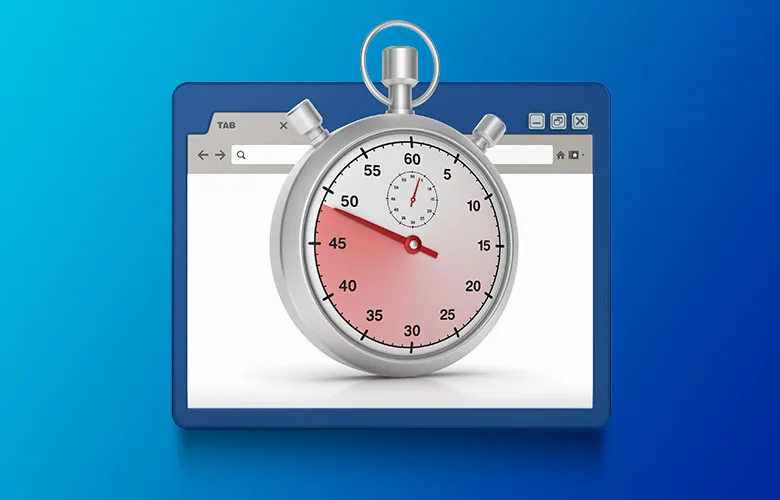Website Speed for Lawyers: Because Every Second = Fewer Leads

Your potential client just searched for “divorce attorney near me” on their phone at 11 PM, while lying in bed and questioning everything about their life. They click on your website link, and then… they wait. And wait. Three seconds pass. Four seconds. Five seconds. They’re gone, clicking the back button and choosing your competitor’s site, which loads instantly.
At PaperStreet, we’ve seen this scenario play out thousands of times in website analytics. Law firms invest heavily in beautiful designs, compelling content, and strategic SEO, only to lose potential clients in those crucial first seconds when their website fails to load quickly. In the legal industry, where clients often need immediate answers to urgent problems, website speed isn’t just a technical nicety. It’s a competitive weapon.
Here’s the brutal reality: If your law firm website takes longer than three seconds to load, you’re hemorrhaging potential clients before they even see your credentials, your success stories, or your contact information. Every additional second of load time dramatically increases the likelihood that visitors will abandon your site and choose a competitor instead.
The Psychology of Impatience in Legal Marketing
When someone searches for legal services, they’re rarely browsing casually. They’re dealing with problems that require immediate attention, like a DUI arrest, a divorce filing, a business dispute, or a personal injury. These situations create urgency and emotional stress that make people even less patient with slow websites.
Think about your own behavior when you need something urgently. If you’re looking for an emergency plumber at midnight, you’re not going to wait around for a slow website to load. You’ll immediately click to the next result. Your potential legal clients share the same mindset. They want answers and assistance now, not after a lengthy wait.
This impatience is particularly amplified on mobile devices, where the majority of legal searches now take place. Mobile users are often dealing with smaller screens, potentially slower connections, and the inherent urgency of searching for legal help while away from their computers. Every second of delay on mobile is magnified in terms of user frustration and abandonment rates.
The psychological impact goes beyond mere impatience. Slow-loading websites create subconscious associations with incompetence, outdated practices, and a lack of attention to detail. If a law firm can’t manage to keep its website running efficiently, potential clients wonder whether it can handle complex legal matters effectively.
The Business Impact: Converting Speed into Revenue
Website speed directly correlates with conversion rates, and for law firms, conversions mean new clients and increased revenue. Research consistently shows that even one-second delays in page load time can reduce conversions by 7%. For a law firm generating 100 leads per month, that’s seven fewer potential clients, which could translate to tens of thousands of dollars in lost revenue.
The impact becomes more dramatic as load times increase:
- 1-3 seconds: Acceptable performance that maintains user engagement
- 3-5 seconds: Noticeable delays that increase bounce rates significantly
- 5+ seconds: Catastrophic performance that drives away most visitors
Mobile performance is even more critical. Google data shows that 53% of mobile users abandon sites that take longer than three seconds to load. Since mobile searches now account for the majority of legal service queries, poor mobile performance can devastate a law firm’s lead generation.
Technical Factors That Kill Law Firm Website Speed
Most law firm websites suffer from predictable speed problems that are relatively easy to identify and fix. Understanding these common culprits helps prioritize improvements that will have the biggest impact on performance.
Oversized Images: Law firms love high-resolution photos of their offices, team members, and legal libraries. These images are often several megabytes each, creating massive load times. A single unoptimized photo can slow down an entire page more than all the text content combined.
Bloated Themes and Plugins: Many law firm websites use WordPress themes packed with features they’ll never use, or accumulate plugins over time without considering the performance impact. Each additional feature and plugin adds code that must be loaded with every page view.
Poor Hosting: Budget hosting solutions might seem attractive, but they often provide inadequate server resources for law firm websites. Shared hosting plans that work for basic business websites can buckle under the traffic demands of competitive legal markets.
Unoptimized Code: Websites built without performance considerations often include redundant code, inefficient database queries, and unnecessary scripts that slow down every page load.
Third-Party Integrations: Chat widgets, social media feeds, analytics tools, and other third-party services can significantly impact load times if not properly optimized or if they come from slow external servers.
Mobile Speed: The Make-or-Break Factor
Mobile website performance presents unique challenges that many law firms underestimate. Mobile devices typically have less processing power than desktop computers, mobile internet connections can be slower and less reliable, and mobile users have even shorter attention spans than desktop users.
The technical requirements for mobile speed optimization differ from desktop optimization:
- Responsive Images: Images must be optimized for multiple screen sizes and resolutions
- Touch-Friendly Design: Interactive elements must be sized and spaced for finger navigation
- Simplified Navigation: Mobile menus and navigation must be streamlined for smaller screens
- Reduced Content: Mobile pages often benefit from more concise content that loads faster
Google’s mobile-first indexing means that your mobile site’s performance directly impacts your search rankings. Sites that perform poorly on mobile devices will see a decrease in search visibility across all devices, not just mobile.
The Competitive Advantage of Speed
In competitive legal markets, website speed can be a significant differentiator. When potential clients are comparing multiple law firms, the one with the fastest, most responsive website often wins by default, not because of superior legal expertise, but because it provides a better initial user experience.
Fast websites also tend to rank higher in search results, creating a compounding advantage. Better search rankings lead to more traffic, and faster load times convert more of that traffic into leads. This creates a positive feedback loop that can significantly impact a law firm’s growth.
Website speed is no longer optional for law firms serious about competing online. In an industry where trust and competence are paramount, a slow website undermines both before potential clients even read your content or learn about your qualifications.
At PaperStreet, we help law firms optimize their website performance to ensure every visitor has the best possible experience from the moment they click through to your site. Because in legal marketing, those first few seconds can determine whether a visitor becomes a client or chooses your competitor instead.
Join our newsletter, where you will learn educational info on latest insights, tips and best practices.
Share:
About Us
Did you know more than 200 clients have worked with PaperStreet for more than 10 years?
Get a Free Website
Analysis and Consultation
Marketing Services




